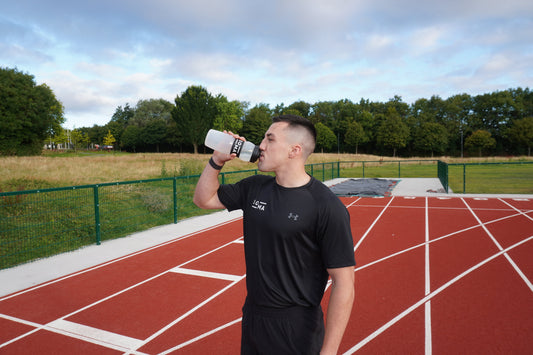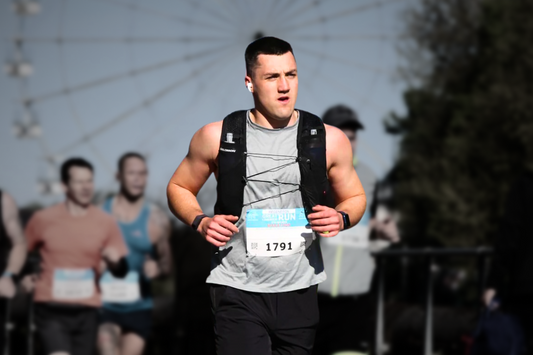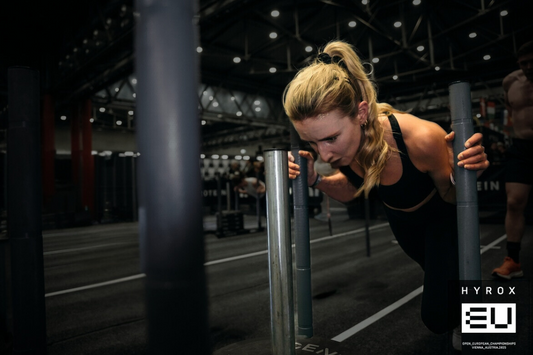Have you ever wondered, "What are electrolytes?" or "Can electrolytes boost my performance?" If so, you're in the right place.
Electrolytes are powerful minerals that can significantly impact your hydration. In this blog, we'll kick things off with a rundown of all the electrolytes and explore their roles in supporting athletes. We'll also discuss the potential consequences of low electrolyte levels before concluding with tips on incorporating electrolytes into your diet.
When we think of electrolytes, hydration often comes to mind. However, their role extends much further. They are crucial for various bodily functions, including muscle contraction, blood pressure regulation, and nerve signalling, to name a few.
What are electrolytes?
While all electrolytes contribute to a healthy body, certain ones demand extra attention, especially for athletes. Sodium and potassium, for instance, are lost through sweat and need to be replaced to maintain fluid balance.
So, what are the electrolytes?
Sodium
Sodium plays a vital role in maintaining fluid balance and supporting nerve function. Its contribution to sustaining hydration levels and facilitating effective nerve signaling is pivotal for muscle contractions and overall athletic performance.
Potassium
Like sodium, potassium facilitates proper muscle contractions, helps prevent cramps, and contributes to maintaining fluid balance. Potassium is crucial for athletes as it ensures optimal muscle function during intense physical activity.
Calcium
Calcium is commonly associated with bone health, and for good reason. However, it also plays a role in muscle contraction and nerve transmission, supporting athletes in maintaining strong bones and efficient neuromuscular coordination.
Magnesium
Magnesium contributes to energy metabolism and muscle function. It helps athletes optimize oxygen delivery to muscles, reduce muscle cramps, and enhance overall endurance during physical exertion.
Chloride
Chloride assists sodium and potassium in transmitting nerve impulses and muscle contractions. It also helps maintain proper fluid balance, supporting athletes in staying hydrated and performing well.
Phosphate
Integral to ATP, the body's primary energy currency, phosphate supports rapid energy release. This energy system is crucial for quick bursts of intense activity, making it essential for athletes engaged in activities requiring explosive power.
Bicarbonate
Bicarbonate acts as a buffer to regulate acidity levels in the body. Some research suggests it may help combat muscle fatigue by reducing the impact of lactic acid accumulation, allowing athletes to sustain high-intensity efforts for longer durations.
So, while we need electrolytes to survive, they can also significantly boost athletic performance. From an athlete’s perspective, being strategic about sodium and potassium intake, especially on big training or competition days, is crucial!
Have you ever finished a run or an intense strength session and noticed a thin layer of white, salty residue on your arms or forehead? This is your body losing sodium through sweat, indicating that you might be a high-sodium sweater.
Maintaining optimal electrolyte levels is essential for peak performance, whether you’re training, competing, or playing a match. Ensuring adequate stores of electrolytes in your body will help you perform at your best.

What Are The Symptoms Of Low Electrolytes?
As we now understand, low electrolytes or an electrolyte imbalance can manifest in various symptoms that negatively impact performance. Here are some common signs to look out for:
Muscle Cramps
One of the most noticeable signs, muscle cramps, can occur when there's an imbalance in electrolytes, particularly sodium and potassium, which are essential for proper muscle contraction.
Fatigue and Weakness
Another significant symptom to watch out for! Inadequate electrolytes can lead to muscle weakness and an overall sense of fatigue, negatively impacting your ability to sustain energy and power during exercise.
Nausea and Dizziness
Low electrolyte levels may cause feelings of nausea and dizziness, both of which can be quite debilitating, even for simple physical tasks.
Headaches
Dehydration resulting from low electrolytes can contribute to headaches, affecting an athlete's focus and performance. While athletes often turn to plain water to solve or prevent this problem, increasing your sodium and potassium intake around training might be more effective if you struggle with headaches.
Impaired Cognitive Function
An electrolyte imbalance can affect nerve function, leading to difficulties in concentration and coordination. This is crucial for both maintaining focus during the day and performing high-intensity physical tasks that rely heavily on proper cognitive function.
Increased Susceptibility to Heat-Related Issues
Lastly, electrolyte imbalances can contribute to heat-related problems such as heat cramps, heat exhaustion, or even heatstroke, especially in hot and humid conditions. While this may not be relevant for all athletes, it’s an important factor to keep in mind.
How Can You Consume Electrolytes?
Foods
Prioritising food as your primary source of nutrients, whether electrolytes, vitamins, or minerals, is crucial. Potassium-rich foods such as avocado, potato, banana, and various greens are straightforward choices. However, obtaining sufficient sodium can be more challenging due to the prevalence of heavily processed junk food in many diets.
As athletes, avoiding these options is generally advisable. While adding a pinch of salt to nutritious meals is an option for boosting sodium intake, many find it more convenient to supplement their diet with sodium through dietary supplements.
Sports Drinks
Designed to replenish lost electrolytes during exercise, commercial sports drinks typically contain a blend of sodium, potassium, and carbohydrates. It’s important to be mindful of their sugar content and choose options with minimal additives. Some sports drink manufacturers include unnecessary ingredients to either increase profit margins or reduce production costs.
When selecting a sports drink, opt for one with appropriate electrolyte levels, avoiding excessive sugar and unnecessary additives.
Electrolyte Supplements
Many athletes have specific electrolyte needs. If you fall into any of the categories below, a high-quality electrolyte supplement could greatly benefit your performance:
- Your sessions are longer than average, especially for runners.
- Your workouts rank at least 7/10 on a scale of exertion.
- You train or compete in a hot climate.
- You train more than once per day.
- You consume a predominately whole foods diet.
Choosing a 100% natural electrolyte powder ensures you're only consuming what your body needs, without unnecessary additives.





